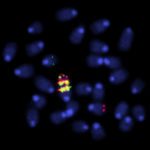Lien vers Pubmed [PMID] – 16681639
Br. J. Haematol. 2006 Jun;133(5):520-5
Non-homologous end joining (NHEJ) is an important determinant of genomic stability in mammalian cells. This DNA repair pathway is upregulated in a subset of B-cell chronic lymphocytic leukaemia (B-CLL) cells resistant to DNA damage-induced apoptosis. Using an in vitro assay for double-strand breaks (DSB) end ligation, we studied the fidelity of DSB repair in B-CLL cells which were resistant or sensitive to in vitro DSB-induced apoptosis with concomitant patients’ resistance or sensitivity to chemotherapy, respectively. The fidelity of DNA repair was determined by DNA sequencing of polymerase chain reaction products cloned in pGEM-T vector. Sequence analysis of DNA end junctions showed that the frequency of accurate ligation was higher in sensitive B-CLL cells and control cell lines, than in resistant cells where end joining was associated with extended deletions. Upregulated and error-prone NHEJ in resistant cells could be a quite possible mechanism underlying both genomic instability and poor clinical outcome.

